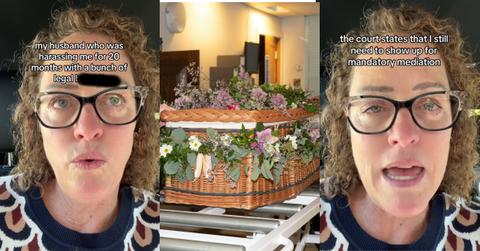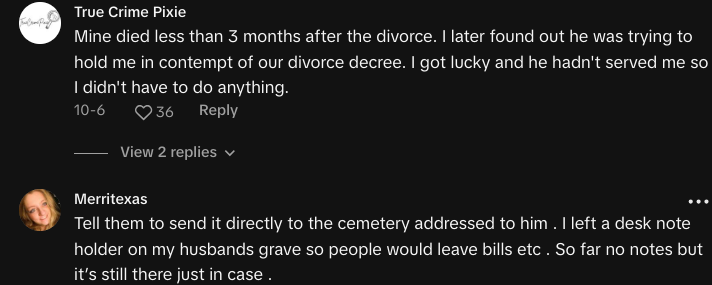“Hope He Rots” — Woman Says Dead Husband Is Suing Her Over Cat Healthcare Bills
"That's crazy!! I'm so sorry."
Published Nov. 9 2024, 2:00 a.m. ET

A woman's husband is suing her from beyond the grave. Lucinda (@imagrownupnow) was in the middle of divorcing her departed husband when he hit her with a lawsuit for their 15-year-old cat's health bills.
However, he died before they could go to court for the grievance. "I swear you can't make this s--t up," Lucinda says at the top of the video, looking directly into the camera. "My husband who was harassing me for 20 months with a bunch of legal bulls--t."
She takes a pause to explain her situation. "All I was trying to do was get divorced. Instead he had a heart attack and died. So now I'm a widow. But on Aug. 28, he filed a small claims suit against me," she says.
One would think that any type of legal action he was trying to take against his wife would be dead along with him, right? Well, that's actually not the case. Lucinda further detailed the nature of the small claims suit.
"Claiming $4,200 worth of vet bills for our 15-year-old cat. And he was taking me to court for that," she said. Even though her husband is dead and buried, the hand of justice still doesn't rest. "So now, even though he has died, the court states that I still need to show up for mandatory mediation," she continued.
"So this f--ker is still harassing me and suing me from the grave. It's f--king crazy," she says to close out the video.
Howell Justice has published a piece that delineates what happens when the plaintiff in a lawsuit dies in the middle of it.

The firm's piece on the matter seems rooted in insurance claims pertaining to personal injury. Since the root of these claims are in in "pain and suffering," many insurance companies would argue that since technically, the "pain and suffering" of a client has ended, that their claim goes out the window.
This could be weaponized by insurance companies to intentionally stall out lawsuits and proceedings in the hopes that folks would pass away. If they don't have any loved ones to try and start a new suit or get involved in the case, presumably these companies would be off the hook.
However in some places, like California, a law was passed that seemingly nullifies this tactic from insurance companies. As the statute indicates, a representative of that plaintiff could carry out the case and collect any settlements or damages issued by a judge.

Attorneys at Law Gausnell, O'Keefe, & Thomas LLC also penned a write-up on the complications that can occur when a plaintiff passes away during settlement proceedings of a personal injury lawsuit.
This firm also echoed the same sentiments of the aforementioned, referencing representatives that can handle claims after a plaintiff dies.
However, the same firm goes on to state that this isn't exactly a straightforward process, either. If a legal team represents a client who passes away before the settlement agreements are signed and verified and if there hasn't been a representative named for the plaintiff, then that further complicates matters.
At that point, the client/attorney relationship has ultimately been nullified due to the fact that the client is no longer alive. "The death of any party during the negotiations calls into question the enforceability of the settlement, including the execution of a release by a personal representative who was not a party when the 'settlement' was reached. The question then is whether a meeting of the minds occurred between the parties, given the death of the plaintiff was not disclosed until after the “settlement” was reached."

Beresford Booth Lawyers also repeated this bit of legal wisdom, writing: "The only person who can pursue a deceased plaintiff’s claims is the personal representative or administrator of their estate."
The legal group added: "Similarly, without their estate’s substitution into the case, a departed defendant cannot reasonably defend against a surviving plaintiff’s claims. Once an estate is substituted in for the deceased party, the estate (through the personal representative or administrator) can continue the case just as if the party were still alive."
The same legal resource penned that if a defendant dies in a case, then matters are much simpler: the defendant is no longer there then "the case is over," well, for them at least.
But for the plaintiff to try and collect money from a dead person is a bit more difficult, as an estate needs to be established.
Beresford went on to write: "Ultimately, if a party dies, the case is put on pause until the party’s estate can substitute into the case, at which point it will continue until it reaches a conclusion."
The firm concluded by saying that if a person's testimony was an integral part of the case, then their death could have an impact on the settlement or judgment.

Additionally, Truitt Law Offices writes about "survival action" in a piece on lawsuits where a party member passes away. The firm writes: "A survival action is a legal process that allows another person to begin or continue an injury claim on behalf of a deceased victim. When someone files a survival action, they essentially act as a substitute for the deceased, and any money they recover will go to the deceased person’s estate."
If you're involved in a lawsuit, please refer to an accredited legal representative pertaining to any and all matters regarding legislation. This article is intended to be informative, not legal advice.